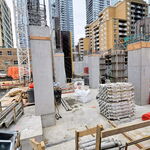reaperexpress
Senior Member
GO RER has not been built yet and until it is it makes no sense to siphon money into fancy HSR. We need the money to build the base network to connect as many towns and cities by frequent rail service. Then HSR makes sense to build. Until VIA has jam packed trains running hourly between Toronto and Ottawa/Montreal, there is no market for HSR that would justify its cost.
I totally agree with you, but not about that corridor. This is exactly my thought west of Toronto, where the population is distributed in a number of cities of 300 000 - 500 000 people spaced around 20 - 80 km apart. The best bang-for-the buck is to invest in Regional rail, which will improve Intercity rail as a side-effect.
But from Toronto to Montreal, it's 550 km with just Ottawa (1M) and Kingston (300k) along the way. Given that any form of frequent service would require infrastructure investment to the tune of billions of dollars, we might as well invest in dedicated passenger infrastructure (i.e. HSR). Continuing to invest in CN lines will continue to result in conflicts which reduce speed (45mph to switch tracks) as well as reliability. Shared freight/passenger lines are also more expensive to maintain and operate because of the wear caused by heavy freight trains, and the longer trip times (larger fleet requirement, higher personnel costs and lower revenue).
Last edited:





